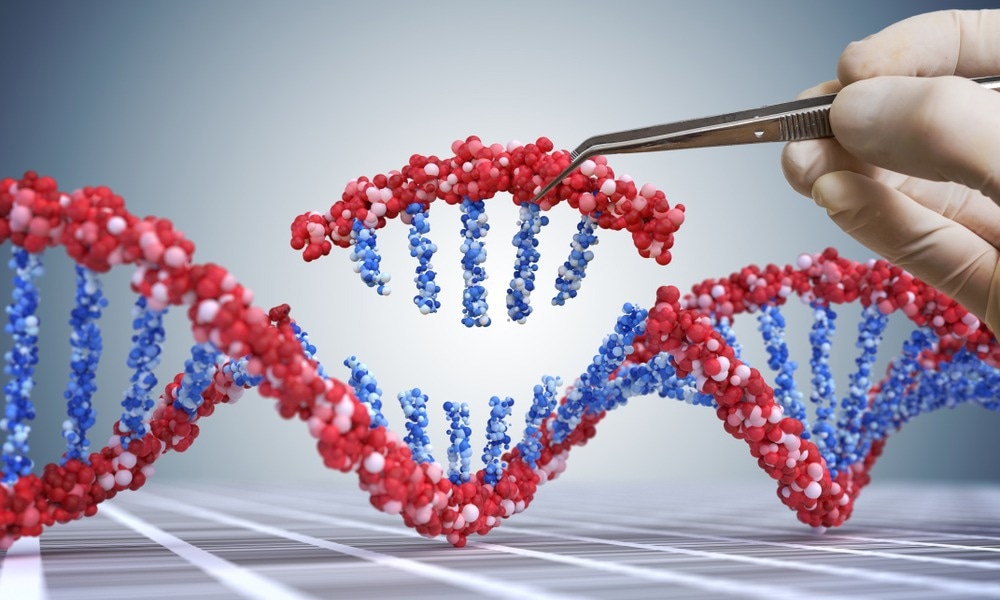Mucopolysaccharidosis IV A (MPS IVA) is a metabolic disorder caused by the mutations of the GALNS gene, leading to the accumulation of chondroitin 6-sulfate and glycosaminoglycans (GAGs) keratan sulfate in the lysosomal lumen.

Study: Delivery and assessment of a CRISPR/nCas9-based genome editing system on in vitro models of mucopolysaccharidoses IVA assisted by magnetite-based nanoparticles. Image Credit: vchal/Shutterstock.com
Enzyme replacement therapy has shown advantages in treating such disorders in patients. However, this therapy has disadvantages, including impact on the bone lesion and recovery of oxidative profile.
Recently, a gene therapy based on CRISPR/nCas9 system was presented as a promising strategy to treat in vitro MPS IVA model. An article published in the journal Scientific Reports used CRISPR/nCas9 system on several MPS IVA fibroblasts with GALNS mutations to evaluate their potential in gene therapy.
The CRISPR/nCas9 system was combined with magnetite-based nanoparticles entrapped in a liposome-based novel non-viral vector to develop safer vectors for gene therapy. The CRISPR/nCas9 treatment increased the enzyme activity of wild-type levels and reduced the lysosomal mass, glycosaminoglycans (GAGs) accumulation, and oxidative stress based on mitochondria.
Viral vectors composed of magnetite-based nanoparticles entrapped in liposomes showed similar results as lipofectamine, a conventional transfection agent. Overall, the results confirmed CRISPR/nCas9 system as a promising genome editing tool for treating MPS IVA. Besides, the potential use of magnetite-based nanoparticles entrapped in liposomes was illustrated as an ideal delivery system for gene therapy.
CRISPR/nCas9 Towards MPS IVA
MPS IVA is an autosomal recessive lysosomal storage disorder characterized by intracellular accumulation of keratan sulfate and chondroitin-6-sulfate. Under impaired activity of the GALNS gene, various oxidative stress and inflammation-based pathological signal pathways might occur.
The autosomal recessive MPS IV A affects approximately 1 in 200,000 lives and is characterized by various symptoms, including severe skeletal abnormalities, hearing loss, corneal clouding, heart valve disease, and other impairments.
Enzyme replacement therapy is the most accepted treatment for MPS IV A. Here, recombinant enzyme is injected into patients to replace the missing GALNS enzymatic activity. To improve the delivery of recombinant GALNS to the bones of MPS IV A patients, one proposed variant of GALNS contains six additional glutamate residues at the N terminus.
Technologies based on CRISPR/Cas have been repurposed for genome modification, mediating a true revolution in synthetic biology and metabolic engineering. With numerous applications in diverse prokaryotic and eukaryotic species, CRISPR/Cas9 approaches continue to facilitate the design and construction of synthetic organisms.
CRISPR/Cas9 was adapted from a naturally occurring genome editing system used by bacteria as an immune defense. CRISPR/Cas9 is a cost-effective and highly specific nuclease-based genome editing mechanism. Besides Cas9 variants, Cas9 nickase (nCas9) shows an increased target-specific efficiency.
CRISPR/nCas9 Towards MPS IVA Assisted by Magnetite-Based Nanoparticles
Some genome editing-based novel strategies have overcome the challenges in conventional gene therapy. Particularly, CRISPR/nCas9 showed an increased On-target cut efficiency and decreased the Off-target effect.
Recently, gene therapy based on CRISPR/nCas9 system was reported as a potential approach toward MPS IVA in vitro treatment, devoid of the Off-target effects and with pathological biomarker’s recovery to wild-type levels. Although viral vectors were used due to their natural transduction capacity, the non-viral counterparts could overcome the limitation posed by the viral vectors.
For example, a cell-penetrating vector based on magnetite-silver nanoparticle-based core-shell and pH-responsive magnetite-based nanoparticles were prepared as a carrier for nucleic acids with the ability to form a complex with nucleic acids through a pH-responsive polymer.
The presence of membrane translocating peptide Buforin II on the carrier enabled them to escape the endolysosomal degradation pathway. Furthermore, the fabricated magnetite-based nanoparticles were entrapped in liposomes to prevent extracellular nuclease-induced DNA degradation.
In the present study, the potential of magnetite-based nanoparticles entrapped liposomes were tested as CRISPR/nCas9 carriers by conducting in vitro experiments on MPS IVA fibroblasts with different GALNS gene mutations. The results revealed an increase in the GALNS activity for all MPS IVA fibroblasts, indicating the robustness of the CRISPR/nCas9 system when coupled with magnetite-based nanoparticles.
The effect of magnetite-based nanoparticles coupled CRISPR/nCas9 system was evaluated by using various biomarkers and the results demonstrated a reduction in lysosomal mass, GAGs, and mitochondrial reactive oxygen species (mtROS), confirming the potential of CRISPR/nCas9 system in treating MPS IVA.
Conclusion
To summarize, the CRISPR/nCas9-based genome edition system was used to treat MPS IVA containing different mutations in four in vitro models using a non-viral vector composed of magnetite-based nanoparticles entrapped in liposomes for the delivery of the CRISPR/nCas9 system.
The results revealed an increased GALNS activity for all the MPS IVA fibroblasts, demonstrating a reduced lysosomal mass, mtROS, and GAGs after treatment with CRISPR/nCas9 system using both magnetite-based nanoparticles entrapped in liposomes and conventional liposomes.
The β-hexosaminidase activity was also observed to have recovered after transfecting the CRISPR/nCas9 system, confirming the CRISPR/nCas9 system as a potential strategy for MPS IVA treatment when combined with a non-viral vector. Thus, through the present study, the importance of genetic backgrounds during the evaluation of therapeutic strategies was demonstrated for therapy success.
Reference
Leal, A.F et al. (2022) Delivery and assessment of a CRISPR/nCas9-based genome editing system on in vitro models of mucopolysaccharidoses IVA assisted by magnetite-based nanoparticles. Scientific Reports 12, 15045. https://www.nature.com/articles/s41598-022-19407-x
Disclaimer: The views expressed here are those of the author expressed in their private capacity and do not necessarily represent the views of AZoM.com Limited T/A AZoNetwork the owner and operator of this website. This disclaimer forms part of the Terms and conditions of use of this website.